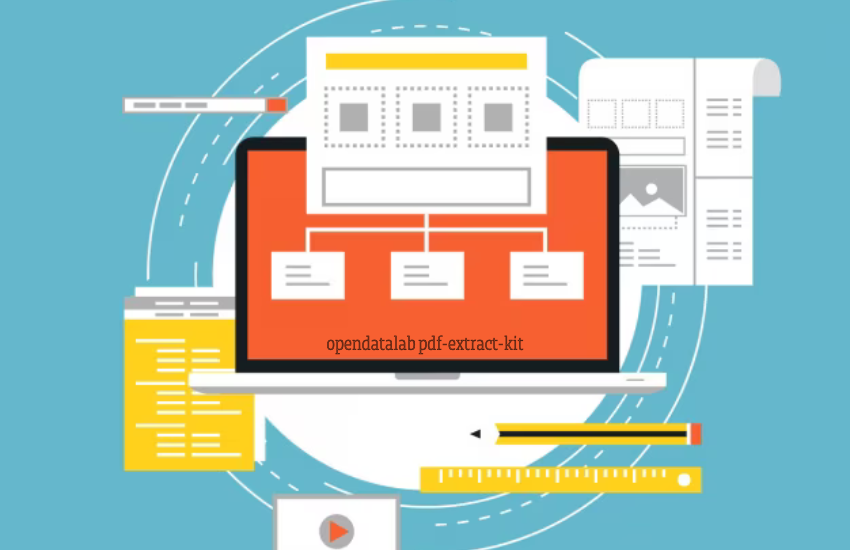In today’s data-driven world, information is often locked away in unstructured formats, especially PDFs. This is where Opendatalab PDF-Extract-Kit comes into play. Developed by Opendatalab, a company known for building cutting-edge data solutions, the PDF-Extract-Kit is designed to help users easily extract data from complex PDF files. Whether you are dealing with financial reports, legal documents, or research papers, this tool offers a reliable solution for automating the extraction of valuable data.
The increasing reliance on PDFs for sharing data has made it essential for organizations to use efficient tools for PDF data extraction. This kit by Opendatalab not only simplifies the process but ensures accuracy and scalability for both small and large-scale operations.
Key Features of PDF-Extract-Kit
One of the standout qualities of the opendatalab pdf-extract-kit is its comprehensive feature set, designed to cater to diverse user needs. Some of the key features include:
- High Speed and Accuracy: The PDF-Extract-Kit is built to handle large datasets without compromising on accuracy. It ensures that even the most complex data is extracted precisely.
- Integration Capabilities: It seamlessly integrates with existing systems, such as databases, data pipelines, and other document management tools, making it adaptable to any environment.
- Support for Complex PDFs: Whether your PDF contains tables, forms, or scanned images, the kit can accurately extract the data.
- Multi-format Export: Once the data is extracted, it can be exported into various formats such as CSV, JSON, XML, or directly into databases.

How PDF-Extract-Kit Works
Getting started with PDF-Extract-Kit is a straightforward process. Below is a step-by-step guide:
- Install the Tool: Download and install the tool from Opendatalab’s official repository or platform. It supports Windows, Mac, and Linux environments.
- Upload PDF Files: Choose the PDF files you need to extract data from. You can upload multiple PDFs at once for batch processing.
- Define Extraction Parameters: Choose the type of data you wish to extract—text, tables, images, or forms.
- Run the Extraction Process: Once parameters are set, the tool processes the PDFs and extracts the desired data.
- Export Data: After extraction, you can export the data into a format of your choice, such as CSV, JSON, or even SQL.
Use Cases for PDF-Extract-Kit
The PDF-Extract-Kit offers a wide range of use cases, making it versatile for various industries:
- Finance and Accounting: Automatically extract data from invoices, financial reports, and statements for easier auditing and record-keeping.
- Legal Sector: Lawyers and paralegals can quickly pull relevant information from legal contracts, case files, and court documents.
- Government Reports: Simplify the extraction of data from regulatory filings, compliance documents, and other public sector reports.
- Academic Research: Extract tables, citations, and statistics from scholarly articles and research papers for analysis.
Benefits of Using Opendatalab PDF-Extract-Kit
The advantages of using the Opendatalab PDF-Extract-Kit are numerous:
- Saves Time: The automation of data extraction can save hours, if not days, of manual labor.
- Reduces Errors: Manual data entry is prone to mistakes. PDF-Extract-Kit reduces human error by providing precise results.
- Scalability: Whether you’re processing one PDF or thousands, the tool scales to meet your needs.
- Accuracy: The tool excels at maintaining the integrity of data, ensuring accuracy even with complex or large PDF documents.
Comparative Analysis of PDF-Extract-Kit with Other Tools
When compared to other PDF extraction tools like Adobe PDF Extractor or Tabula, the PDF-Extract-Kit holds several advantages. While Adobe’s tool is known for its integration with Adobe products, Opendatalab’s solution offers broader integration with non-Adobe workflows and is more versatile in handling complex data structures like tables within PDFs.
Additionally, while open-source tools like Tabula are useful, they often lack the performance and accuracy seen in the PDF-Extract-Kit, especially when dealing with scanned documents or PDFs with embedded images.
Technical Specifications and Requirements
To operate PDF-Extract-Kit, you’ll need to ensure your system meets certain technical specifications:
- Supported Platforms: Windows, macOS, and Linux
- Programming Language Compatibility: Python, Java, and other popular programming languages
- System Requirements: At least 4 GB of RAM, and 2 GHz processor. Depending on your workload, higher specifications might be needed.
Installation is straightforward and usually involves setting up a few dependencies before launching the tool.
Integration with Data Pipelines
A key feature of the PDF-Extract-Kit is its ability to integrate into existing data pipelines. Users can connect the kit to their ETL (Extract, Transform, Load) workflows using APIs. This allows real-time extraction of data from incoming PDF documents, making it ideal for industries that need constant data flow, such as finance or logistics.
Handling Different PDF Formats
The PDF-Extract-Kit is capable of handling a variety of PDF formats:
- Text-based PDFs: These are the easiest for the tool to process, extracting text and tables with high precision.
- Image-based or Scanned PDFs: The kit uses OCR (Optical Character Recognition) technology to extract text from images and scanned documents.
- Embedded Objects: It can also extract embedded images, charts, and other objects within a PDF.
Accuracy and Performance Benchmarks
In terms of accuracy, the tool boasts impressive results, even with complex or poorly scanned documents. Benchmarks show that it consistently outperforms other tools, maintaining a high degree of accuracy while processing thousands of pages in a relatively short time frame.
Case Studies and Industry Applications
Several organizations have adopted the PDF-Extract-Kit to streamline their data extraction processes:
- Financial Institutions: A large bank reduced its manual data entry time by 80% by integrating the PDF-Extract-Kit into its workflow.
- Legal Firms: Law firms have used the kit to extract critical information from large volumes of legal documents, saving them significant amounts of time.
Security and Compliance
Data security is a top concern, and the PDF-Extract-Kit ensures that your information remains protected. It adheres to international standards, including GDPR compliance. It also uses encryption to safeguard data, ensuring that sensitive information remains confidential throughout the extraction process.

Pricing and Licensing Options
The PDF-Extract-Kit offers both free and paid versions. The free version allows limited extractions per day, suitable for individual use or small businesses. For large enterprises, the paid version offers unlimited extractions, premium support, and regular updates.
- Licensing Models: The tool is available under various licensing models, including single-user, multi-user, and enterprise-level licenses.
- Support: Paid versions come with 24/7 customer support and guaranteed access to updates.
Common Issues and Troubleshooting
Some users may encounter issues when using the PDF-Extract-Kit, but most problems are easily solvable. Below are some frequently asked questions and their answers:
- Can I use the kit with encrypted PDFs?
- Yes, as long as you have the password, the tool can extract data from encrypted PDFs.
- What are the supported output formats?
- The tool supports CSV, JSON, XML, and direct database exports like SQL.
- Is there a limit on the number of PDFs I can process?
- The free version has a daily limit, but the paid version offers unlimited processing.
- Does the tool support multilingual PDFs?
- Yes, it supports PDF documents in multiple languages, making it suitable for global use.
- How does the kit handle complex table structures?
- The tool is designed to extract even the most complex table structures without data loss.
- What kind of support is available?
- Depending on your license, you have access to email or chat support, with 24/7 availability for enterprise users.
Future Roadmap and Updates for PDF-Extract-Kit
Opendatalab is continuously working on improving the PDF-Extract-Kit. Future updates will focus on deeper AI integrations, making it possible for the tool to not only extract data but also analyze and categorize it automatically. Additionally, user feedback plays a vital role in shaping the roadmap, ensuring that the tool evolves to meet the growing needs of the industry.

